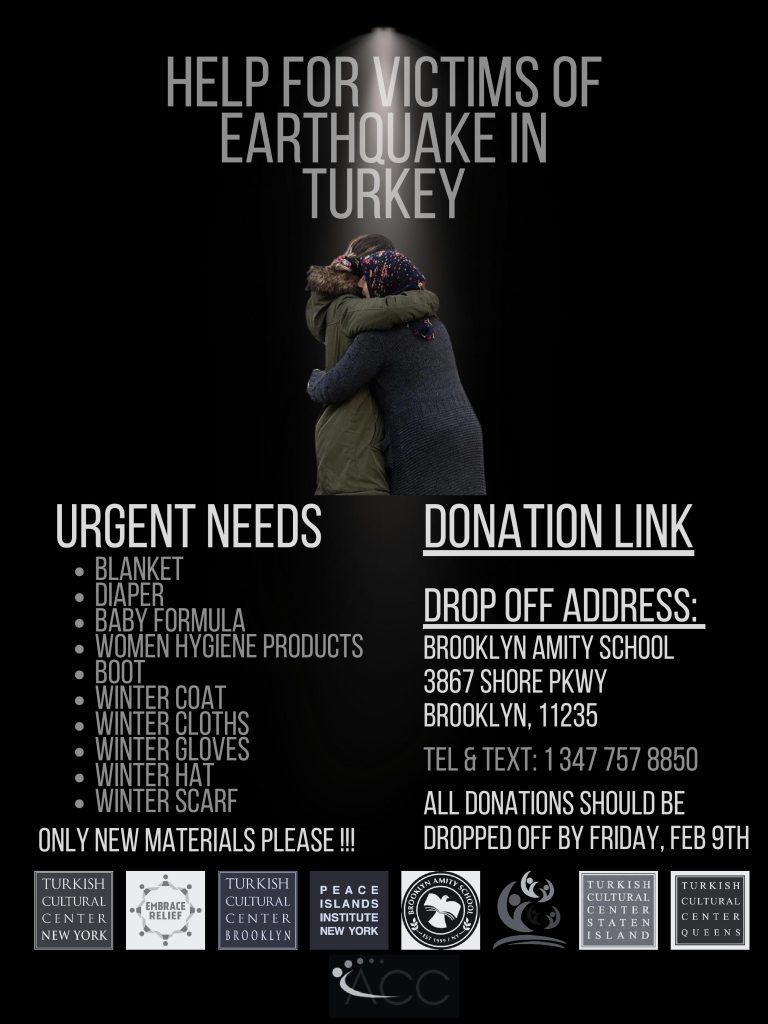February 10, 2023
There are two disparate things on my mind this week that, together, are taking up a great deal of space in my consciousness. The first is the unspeakable tragedy unfolding in southern Turkey and Syria in the aftermath of the earthquake earlier this week. Under any circumstance, this would be heart-breaking, but in this case, there’s a personal element to it too. Over the past number of years, we have developed a close interfaith relationship with the Turkish Cultural Center of Brooklyn. TCC is the Muslim partner of the Brooklyn Interfaith Coalition, and through years of planning meetings, programs, and activities, we have grown quite close to many in that community. We have heard from Göksel Guven, the director of TCC, that his family and other members of his community have loved ones who have been affected by the devastation and destruction. Sally Hipscher wrote about it in the weekly newsletter this week, when the death toll was under three thousand. At the time of this writing, it is over 21,000. The number of injured has risen commensurately, and a region that is already unstable has been thrown into even greater chaos. I am re-posting the flyer and link to Embrace Relief, an organization that provides emergency relief in humanitarian crises around the globe (they earn a 4/4 rating from Charity Navigator, a trusted rating organization) – see below. It will be comforting to Göksel and the great folks at TCC that we are thinking of them and doing what we can to support their fellow countrymen and women.
The second thing is Israel. I was one of about a dozen Brooklyn rabbis (mostly) who met on Wednesday for lunch with Ambassador Asaf Zamir, the Consul General of Israel in New York. While those present were not unanimous in their positions on Israel, the general tenor was one of extreme concern; over the threat to the judiciary, over issues facing non-Orthodox Jewish denominations, over proposed changes to the Right of Return (!), over increasing hostility from the government toward Israel’s Arab citizens and to those living in the Palestinian Authority. Just today, Ha’aretz reported on a bill that would criminalize egalitarian prayer and “immodest dress” at the Western Wall. The bill was put forward by a lawmaker from the Sephardic ultra-Orthodox Shas party. After significant public outcry, the bill was shelved, at least for the time being. According to Ha’aretz, the bill “would have criminalized mixed-gender prayer at the site, as well as immodest dress and the playing of musical instruments. Women would also be forbidden from reading from a Torah scroll or blowing a shofar at the site. Women would also not be allowed to don prayer shawls or tefillin, the leather boxes and straps traditionally worn by Jews during morning prayers, and historically worn only by men.” Violation of the law would have resulted in fines of up to $3,000, or six months in prison. Around our lunch-table, these were the burning issues.
Ambassador Zamir took a larger and longer view of things, generally speaking. I won’t go into detail about his perspective, because I am hoping to get him to address our community in the coming weeks, and he will be able to represent himself much better than I can. His assessment of the Israeli political reality, though, was sober and measured. As he reminded us, we should all be mindful of the fact that Israel is still a democracy, and that the current government represents the majority, apparently. The real question, I would say, and this came up at our meeting, is “when is it time to cry foul?” We have been asking this question in the United States too: at what point does a democracy begin to eat its own tail? How do we know when to say “this is too much?” The January 6th insurrection is a good example, as are the many (and ongoing) attempts to use the machinery of democracy to subvert the democratic process. In Israel, the current exemple-du-jour is the proposed judicial reforms, which would effectively neuter the Supreme Court and place the judiciary in the control of the Knesset, removing judicial oversight and the ability of the court to rule on the foundational appropriateness of basic laws* (Israel has no constitution, as such). In other words, it would effectively be the toppling of one of the branches of government.
If the news is a little bleak this week, the corrective might be this week’s sublime Torah portion. Parashat Yitro has Jethro, Moses’ father-in-law, lay out for him what a judicial system should look like. After Jethro proposes his society-changing reform, which Moses adopts, the people gather at the foot of Mount Sinai. This time, the earth quakes for good, announcing that God is about to reveal Godself to the people through the giving of the 10 Utterances (also known as the 10 Commandments). God reminds the people “how I bore you on eagles’ wings and brought you to Me,” and that they (and we) have the potential to be, indeed that they are to be “a kingdom of priests and a holy nation.”
Let us carry those messages with us through the week, reminders of our role in repairing a damaged world and of our ability to soar ever higher.
Shabbat shalom um’vorach – a peaceful and blessed Shabbat.
Rabbi Sam Levine
*If you’d like to read up on this issue, see this long and thorough Wikipedia article.
